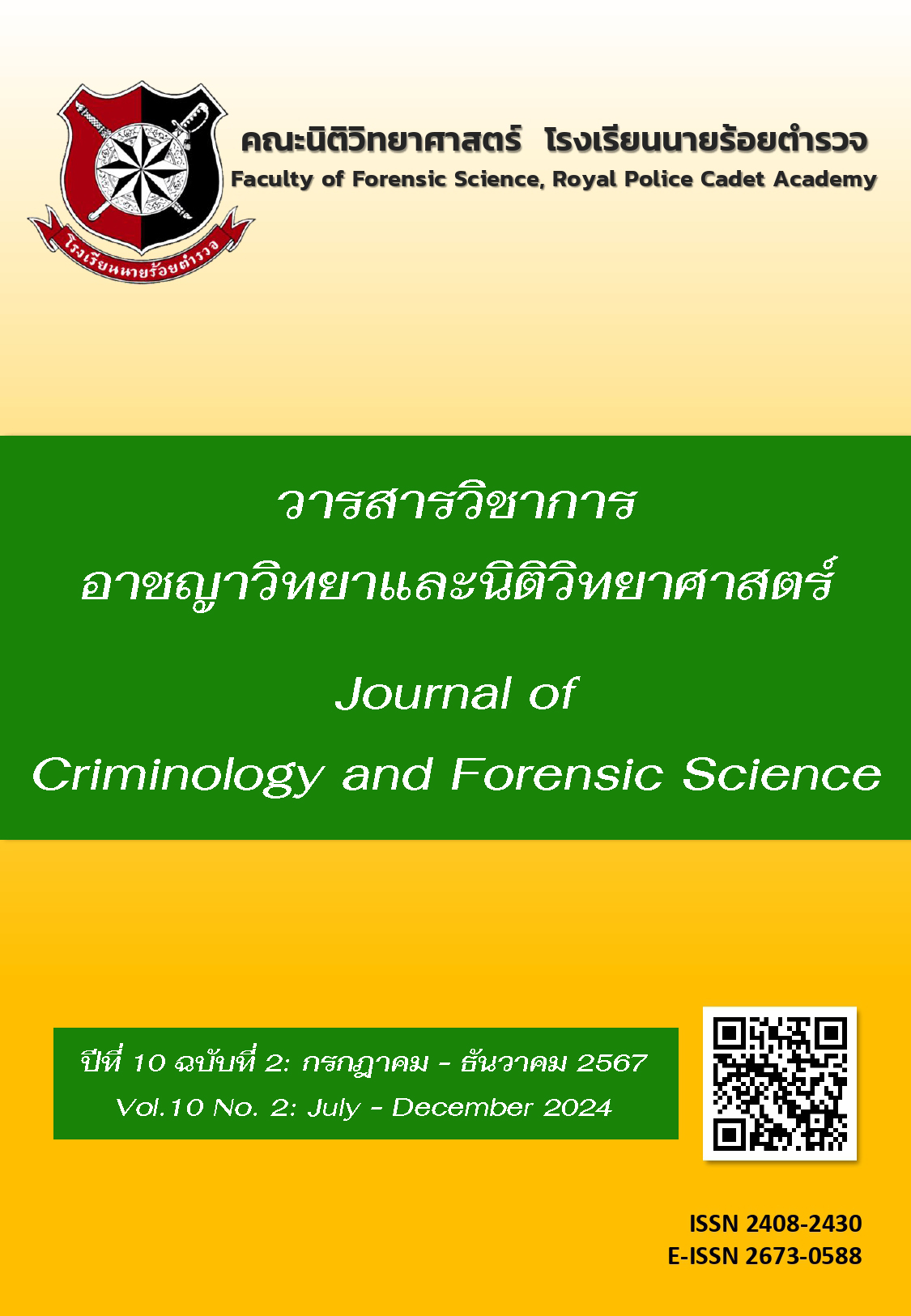Understanding about Crime Scene Investigation of Rayong Police Inquiry Officers
Main Article Content
Abstract
Police play a crucial role in the justice system as they are primarily responsible for cases before they advance to the public prosecutor and judicial proceedings. Inquiry officers are responsible for collecting evidence at the crime scene for use in the prosecution and court trial stages. In modern times, forensic evidence has emerged as a pivotal component in legal proceedings. This study aimed to investigate 1) knowledge and perceptions of forensic evidence collection, and 2) problems and obstacles faced by inquiry officers in the Rayong Provincial Police concerning the collection of forensic evidence. The sample consisted of 126 inquiry officers from the Rayong Provincial Police, who were interviewed using questionnaires on general forensic science topics. Descriptive statistics were applied to personal data, and the correlation between personal variables and forensic science knowledge scores was assessed through One-Way ANOVA. The study revealed that the majority of inquiry officers in the Rayong Provincial Police were male, aged between 51 and 60, with 25 years or more of service. They had been serving as inquiry officers for 5-10 years, held a bachelor's degree, and had received training in forensic evidence collection. Most reported a high level of knowledge and understanding of forensic science. The analysis indicated statistically significant differences in mean scores (P-value ≤ 0.05) based on age, years of service, experience as an inquiry official, and participation in forensic science training sessions. The problems and obstacles identified included insufficient personnel and a lack of knowledge in collecting specific forensic evidence. It is recommended that inquiry officers in the Rayong Provincial Police receive regular training in forensic evidence collection.
Article Details

This work is licensed under a Creative Commons Attribution-NonCommercial-NoDerivatives 4.0 International License.
เนื้อหาและข้อมูลในบทความที่ลงตีพิมพ์ใน วารสารวิชาการอาชญาวิทยาและนิติวิทยาศาสตร์ โรงเรียนนายร้อยตำรวจ ถิอว่าเป็นข้อคิดเห็นและความรั้บผิดชอบของผู้เขียนบทความโดยตรงซึ่งกองบรรณาธิการวารสาร ไม่จำเป็นต้องเห็นด้วยหรือรับผิดชอบใดๆ
บทความ ข้อมูล เนื้อหา รูปภาพ ฯลฯ ที่ได้รับการตีพิมพ์ใน วารสารวิชาการอาชญาวิทยาและนิติวิทยาศาสตร์ ถือว่าเป็นลิขสิทธิ์ของวารสาร วารสารวิชาการอาชญาวิทยาและนิติวิทยาศาสตร์ หากบุคคลหรือหน่วยงานใดต้องการนำทั้งหมดหรือส่วนหนึ่งส่วนใดไปเผยแพร่ต่อหรือเพื่อกระทำการใดๆ จะต้องได้รับอนุญาตเป็นลายลักษณ์อักษรจาก วารสารวิชาการอาชญาวิทยาและนิติวิทยาศาสตร์ ก่อนเท่านั้น
References
Chamsuwannawong, A. (2003). Forensic Science 1 for Crime Investigation, 4th Edition. Bangkok. TCG Printing. (In Thai).
Chayaphan P. (1994). Basic knowledge of criminal investigation Bangkok: Silpsiam Printing Printing Ltd. (In Thai).
Chudchawinporn Y. (2010). Analysis of dika judgments in crominalcases that used forevisic evidence at trial : cases during the year 1997-2006. Master of Science Thesis, Silpakorn University, Nakhon Pathom. (In Thai).
Engsomboon S. (2008). Preliminary inspection of the crime scene. Royal Police Cadet Academy, Nakhon Pathom. (In Thai).
Koloy N. (2021). The guideline for the development of knowledge about the collection of evidence in forensic science of provincial police at Trat province. Master of Science Thesis, Silpakorn University, Nakhon Pathom. (In Thai).
Noikaew R. (2019). The Study of the Significance of Forensic Evidence and Utilizationin Criminal Case : Satun Provincial Police Station. Faculty of Forensic Science, Royal Police Cadet Academy, Nakhon Pathom. (In Thai).
Saenkaew K. (2019). The crime scene investigation development of the police station in provincial police region 8. Master of Science Thesis, Silpakorn University, Nakhon Pathom. (In Thai).
Uamfung, W. (2013). Knowledge and opinions of inquiry officer about collects forensic evidence metropolitan police divistion 7. Master of Science Program in Forensic Science An Independent Study. Silpakorn University, Nakhon Pathom. (In Thai).
Yingcharoen K. (2018). Inquiry police officers’ understanding and use of forensic science in the investigation of specialized criminal cases. Master of Science Thesis, Silpakorn University, Nakhon Pathom. (In Thai).
Yosprasit T. (2018). Knowledge and opinion for collect of evidence in forensic science of inquiry officer in Metropolitan police division 8. Master of Science Thesis, Silpakorn University, Nakhon Pathom. (In Thai).


